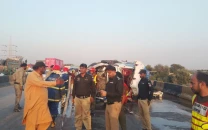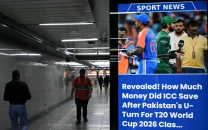Violence in Karachi

Why, for instance, is it possible for even the smallest sectarian or ethnic outfit to hold the entire city of Karachi – a metropolis with twice as many people as New York City and five times its land area – hostage? Why does the entire city shut down at even the slightest hint of violence? And is there a connection between the violence and the shut downs? We would contend that there is and it is an issue that the people of Karachi need to confront. After every reported terrorist attack around the world, there are always news stories of brave citizens returning to work and carrying on with their lives as if to say to the militants: “[We will] not go gentle into that good night.” Not so in Karachi, where mothers and fathers teach their children to cower inside their homes and not go outside for fear of being hurt. Taking a stand is not something that comes naturally to the people of the city.
Needless to say, militants – many of whom are just bored young men with lots of free time on their hands – find this sort of environment highly encouraging. It gives them a sense of empowerment when nothing else around them does. And so they become malleable cannon fodder in the hands of militant puppet masters, who seek to further their own power by dividing up the population. There is absolutely no logical reason why a non-theologian should care about the Shia-Sunni divide, let alone be incited to violence over the matter. It is an academic discussion that is best left to those who wish to write dissertations on the subject. Incidentally, the religious leaders from across the sectarian spectrum of Karachi in 2002 gathered at Jamia Darul Uloom Binori Town to agree upon a statement reflecting just those sentiments. Whatever happened to that declaration of harmony?
It is easy to blame religious/political leaders or militants for the violence. Yet the hard truth is that the blame lies largely with the population that chooses to remain silent and cower rather than standing up to the insanity of killing another human being for their religious or political beliefs. They would not be able to manipulate young boys into murder if we all took a stand and said that enough was enough. Only then will the killings stop for good. In addition to that, as far as the larger picture is concerned, we need to remind this government that it needs to revisit the issue of madrassah regulation. In fact, the intolerance and bigotry that we find in today’s society and which is the fuel for most sectarian attacks in Pakistan is fostered not only by what is taught in many of our madrassahs but also in the mainstream system of education. In it, the other, epitomised often as the ‘baniya’ Hindu is vilified, ignoring that several million Hindus happen to be Pakistani citizens and religion is glorified and students are made to feel as if theirs is inherently superior to all others.
Published in the Express Tribune, June 13th, 2010.


















COMMENTS
Comments are moderated and generally will be posted if they are on-topic and not abusive.
For more information, please see our Comments FAQ